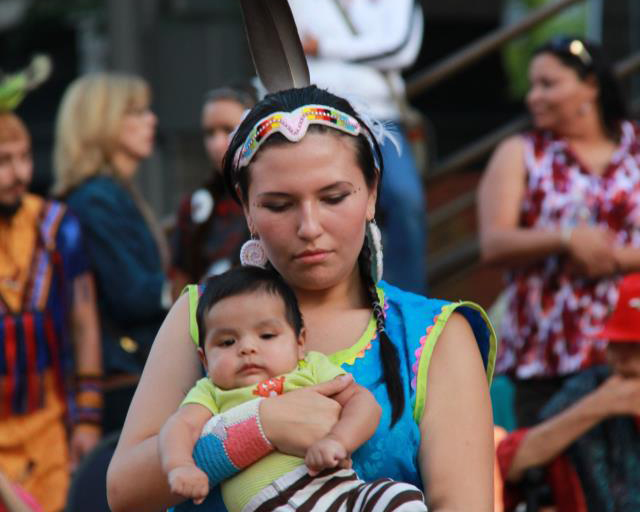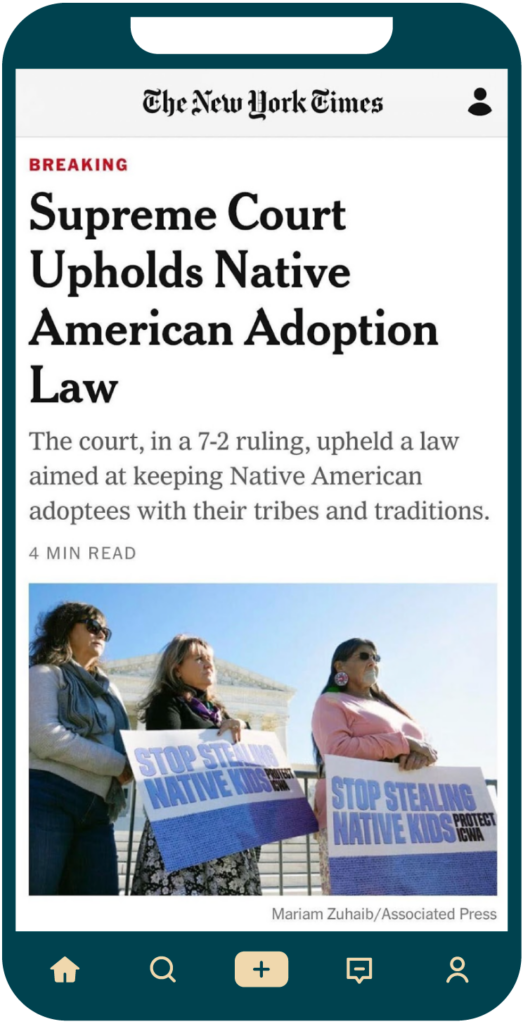What is ICWA?

Enacted in 1978, the Indian Child Welfare Act (ICWA) responded to the crisis of the forced removal of Native children from their families and communities at alarming rates of 25%–35%, with 85% being placed outside their families, even when relatives or tribal members were available to care for them.
ICWA sets minimum federal standards for child custody cases involving Native children, prioritizing their best interests and strengthening family and tribal stability. It mandates efforts to keep families intact, prioritizes out-of-home placements within their family and community, and ensures the child’s tribal nation and family are fully informed and involved in state court proceedings. Widely regarded as the gold standard in child welfare policy, ICWA has guided appropriate placements for Native children that meet all their needs—including cultural and family connections—for decades, and NICWA is committed to upholding this federal law and strengthening its implementation through education, awareness, and improved compliance.
The Heart of ICWA
Made in collaboration with award-winning Producer/Director Karen Odyniec and Producer Milo Daemgen
FAQs About ICWA
What is ICWA and why was it passed?
How does ICWA protect Native children and their families?
When ICWA applies to a child’s case, the child’s tribe and family have a legal right to participate in decisions about services and placements. A tribe, parent, or Indian custodian may also request to transfer the case to the child’s tribal court. ICWA sets federal minimum requirements for the removal and placement of Indian children in foster care, guardianship, or adoptive homes, and allows the tribal nation to intervene as a legal party. ICWA’s protections also apply to placements in residential or group care settings, ensuring culturally supportive and appropriate placements for Native children.
Who is covered by ICWA?
ICWA applies to Indian children involved in state custody proceedings, but specific criteria must be met for it to apply. According to ICWA, an “Indian child” is:
- Unmarried
- Under the age of 18
- A tribal member or eligible for membership and the biological child of a tribal member (25 U.S.C. § 1903)
Under federal law, each tribal nation determines its own eligibility and membership requirements and is the only entity that can determine a child’s membership. For ICWA protections to apply, the child must be a member of, or eligible for membership in, a federally recognized tribe. ICWA’s application is based upon a Native child’s political status as a member of a sovereign tribal nation, not a racial classification. This political status and the government-to-government relationship that tribal nations have with the United States government is enshrined in the U.S. Constitution, federal law decisions, and treaties between the U.S. government and tribal nations.
When does ICWA NOT apply to a Native child’s placement?
ICWA doesn’t apply in certain situations: custody disputes between parents or family members (such as divorce cases), juvenile delinquency proceedings for criminal acts (like theft) that would also be crimes for adults, or cases under tribal court jurisdiction.
Does ICWA apply if the tribe isn’t involved in my child welfare case?
Yes, ICWA still applies. Even if a tribal nation does not actively participate in the case, the state is legally required to follow ICWA requirements to protect the rights of Native children and families.
What considerations should be made in an ICWA case?
When handling an ICWA case, state or private agency caseworkers must:
- Provide active efforts to prevent removal of the child from the home and, when removal is necessary, provide services that strengthen the family so the child can be safely returned home
- Identify a placement that aligns with ICWA’s placement preferences
- Notify the child’s tribe and parents promptly about state court proceedings
- Actively involve the tribal nation, parents, and extended family in case planning and decisions
The caseworker should clearly explain a parent’s rights under ICWA, while also assisting them in advocating for their rights and the best interests of their children.
Who should you contact if you feel that your rights under ICWA are being ignored?
If you believe your ICWA rights are being ignored or violated, contact the following immediately:
- An attorney (Indian and family law experience preferred)
- Legal services
- The child’s tribe
The state court may intervene, ordering alternative services or placements if it finds ICWA has not been properly applied.
What are "active efforts"?
Active efforts are proactive, thorough, and timely actions that are required of states to maintain or reunite a Native child with their family. Active efforts differ from ‘reasonable efforts’ as they go beyond referrals to ensure families receive appropriate support and services.
ICWA mandates active efforts in two areas:
- Preventing the removal of the child or reunifying them after removal. This includes offering culturally appropriate services
- Collaborating with the child’s tribe on all case planning decisions
ICWA’s provisions, including those for active efforts, apply whether or not the child’s tribe is involved in the custody proceedings.
What laws exist to protect the rights of First Nations families?
In the U.S., ICWA applies to federally recognized tribes, but some states have additional laws offering similar protections for First Nations (Native) children from Canada. In Canada, First Nations Child & Family Caring Society is a valuable resource, providing information to provincial or territorial contacts for individual cases.
ICWA mandates active efforts in two areas:
- Preventing the removal of the child or reunifying them after removal. This includes offering culturally appropriate services
- Collaborating with the child’s tribe on all case planning decisions
ICWA’s provisions, including those for active efforts, apply whether or not the child’s tribe is involved in the custody proceedings.

Family separation is not just a piece of history
The Protect ICWA Campaign was established by the National Indian Child Welfare Association, the National Congress of American Indians, the Association on American Indian Affairs, and the Native American Rights Fund, in response to legal challenges to ICWA. Together, we are taking action to uphold ICWA, strengthen tribal child welfare programs, and end the threat of unnecessary removal of Native children from their families and communities by state and private child welfare agencies.
Native children are the future leaders and stewards of tribal sovereignty. The strength of our communities—and our sovereignty—starts with their health and safety.
ICWA 2050: Protect, Preserve, Progress
ICWA 2050 is a commitment to a future where Native children are woven back into the fabric of our cultures with care and intention. It has two main goals:
- Enhance and uphold ICWA protections over 25 years
- Boost tribal nations’ capacity to protect Native children, support families, and guide states on implementing ICWA
While ICWA 2050 sets a clear vision, it allows for flexibility in achieving it. We need to take advantage of windows of opportunity for change, and adapt and learn together to make a lasting difference for Native children and families. Together, we can accomplish things that none of us can do alone.
